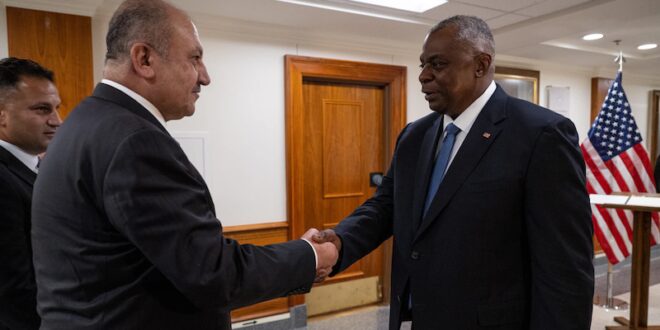U.S. and Iraqi defense leaders discussed an enduring strategic relationship between the two nations during talks at the Pentagon.
Secretary of Defense Lloyd J. Austin III welcomed Iraqi Defense Minister Thabit Muhammad Al-Abassi for a discussion on U.S.-Iraq joint security cooperation dialogue Monday.
This U.S.-Iraq bilateral engagement looks beyond the Defeat-ISIS agreement. The U.S. military has troops in Iraq at the invitation of the Iraqi government to support Iraqi security forces battling the terror group.
“Through the global coalition to defeat ISIS, we have liberated more than 50,000 square kilometers of territory, and more than 4.5 million Iraqis have now been freed from the tyranny of ISIS,” Austin said during the Pentagon meeting. “Today, U.S. and coalition forces continue to advise, assist and enable the Iraqi security forces in the Iraqi lead fight against ISIS at the invitation of the Government of Iraq. The United States stands with the people of Iraq as you build your secure and sovereign and economically vibrant nation.”
The secretary said the relationship is changing as Iraqi forces grow more capable and confident. “The joint security cooperation dialogue reflects our maturing strategic partnership building on the U.S.-Iraq Strategic Dialogue in July 2021 when the U.S. forces with a combat role, ended their mission,” he said.
This meeting looks beyond the defeat of the Islamic State and is an outgrowth of a visit Austin made to Baghdad in March. “We are interested in an enduring defense relationship within a strategic partnership,” said Dana Stroul, deputy assistant secretary of defense for the Middle East, during an interview last week.
Many officials are calling this an agreement on establishing a “360-degree relationship” — meaning it would be a whole-of-government strategic partnership for years.
The U.S. side of the discussion is chaired by Celeste Wallander, the assistant secretary of defense for international security affairs. She is joined by other defense officials and officials from the State Department, the Joint Staff, U.S. Central Command, the Defense Security Cooperation Agency and the National Security Council.
The Defeat-ISIS effort will continue in Iraq and Syria, officials said. The Joint Security Cooperation Dialogue is looking at ways to normalize the bilateral relationship between Iraq and the United States militaries. This includes exercises, military training, exchange programs for officers and NCOs. “All of these are things that we are seeking to build the architecture for an enduring defense partnership with Iraq,” Stroul said.
The military relationship between the countries is good and functions well. Leaders in both countries would like to see the relationship expand in other areas — the economy, cooperation on climate change, diplomatically and more, said Alina Romanowski, the U.S. Ambassador to Iraq. Iraqi Prime Minister Mohammed Al-Sudani “has been very open to this and has been very interested in working in areas that line up with his vision and his objectives to bring stability, sovereignty and security to Iraq,” the ambassador said. “It’s also an opportunity in some ways to continue to support … the reintegration and the engagement of Iraq in the region.”
The dialogue will also look at the Defeat-ISIS mission and the state of the Iraqi Security Forces. While the ISIS caliphate was defeated in 2019, “their ideology remains unconstrained and is still a threat as they seek to rebuild some capacity and capability to conduct attacks and to regain or reemerge as a significant threat to the population in Iraq and Syria,” said Army Maj. Gen. Matt McFarlane, the commander of Combined Joint Operation Inherent Resolve.
He noted that Iraqi forces lead and there is significant progress. There has been a 64% reduction in ISIS attacks in Iraq this year. The general estimated there were about 1,000 ISIS adherents in Iraq and another 1,000 in Syria.
“We also see our partners conducting wide-area security operations, keeping pressure on the ISIS network,” McFarlane said. “Our [special operations forces] continue to dismantle the ISIS network and the leadership network that’s out there,” he said.
 Eurasia Press & News
Eurasia Press & News



